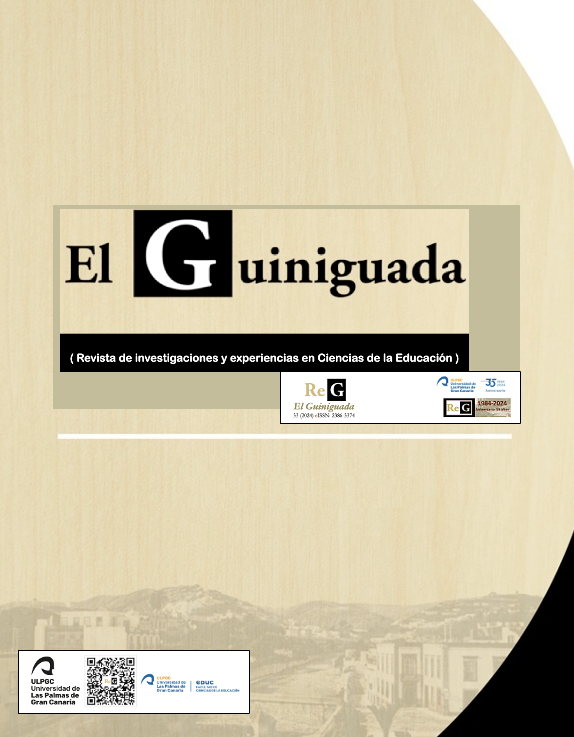School library and gender: Initial training for EFL secondary school teachers
10.20420/ElGuiniguada.2024.712
Keywords:
multiliteracy, gender, social justice, school libraryAbstract
This article is part of the educational innovation project 'Literacy, Gender and Diversity' which promotes the integration of gender perspective into English teacher training. Previous research indicates a scarce presence of literature in English teaching and seeks to promote the construction of school or classroom libraries with a gender perspective within the concept of social justice. The relevance of these libraries in secondary education, where their use is limited, is analyzed, and the need to include female authors, protagonists, and illustrators is emphasized to promote an educational model sensitive to social justice and intersectionality. Following a qualitative research methodology, the study conducted with students of the Master's Degree in Secondary Education Teaching at the University of Valencia includes semi-structured interviews and a questionnaire to show the beliefs of future teachers about the suitability of these topics in school libraries.
Downloads
References
Albelda-Esteban, Beatriz. (2019). Contribución de las bibliotecas escolares a la adquisición de competencias en comprensión lectora en educación primaria en España: una aproximación a partir de los datos del estudio PIRLS 2016. Revista de educación, 384, 11-36.
https://doi.org/10.4438/1988-592X-RE-2019-384-408
Bucholtz, Mary. (2000). The politics of transcription. Journal of Pragmatics, 32, 1439-1465. https://doi.org/10.1016/S0378-2166(99)00094-6.
Castán, Guillermo. (2008). La biblioteca escolar y la igualación de oportunidades. En Elisa Bonilla, Daniel Goldin y Ramón Salaberria (coords.), Bibliotecas y escuelas: retos y posibilidades en la sociedad del conocimiento (pp.77-107). Océano.
Creswell, John W. (2009). Research Design. Qualitative, quantitative and Mixed Methods Approaches. Sage Publications.
Fernández, Grafira. (2018). A biblioteca escolar como axente de dinamización nun centro de ensino secundario. Eduga: revista galega do ensino, 75.
Fraser, Nancy. (2008). Escalas de justicia. Herder.
Hanán-Díaz, Fanuel. (2020). Sombras, censuras y tabús en los libros infantiles. Ediciones Universidad de Castilla-La Mancha.
Jiménez, R. (2021). Diseño y desafíos metodológicos de la investigación feminista en ciencias sociales. Empiria: Revista de metodología de ciencias sociales, 50, 177-200.
Kvale, Steinar. (2011). La entrevista en investigación cualitativa. Morata.
Lage, Juan José. (2013). Bibliotecas escolares, lectura y educación. Octaedro.
Lasa, Begoña. (2016). La incorporación de las escritoras al currículo literario en la Educación Secundaria: Una tarea pendiente. Cuestiones de género: de la igualdad y la diferencia, 11, 423-442. https://doi.org/10.18002/cg.v0i11.3588
López, Pedro y Vellosillo, Inmaculada. (2008). Educación para la Ciudadanía y Biblioteca Escolar. Trea.
López, Ana Belén. (2021). English Book Clubs: Expandindo as linguas alén das aulas. Eduga: revista galega do ensino, 82.
Lopezosa, Carlos. (2020). Entrevistas semiestructuradas con NVivo: pasos para un análisis cualitativo eficaz. En Carlos Lopezosa, Javier Díaz-Noci, y Luís Codina (Eds.), Methodos. Anuario de Métodos de Investigación en Comunicación Social 1 (pp. 88-97). Universitat Pompeu Fabra. https://doi.org/10.31009/methodos.2020.i01.08
Marolla, Jesús y Pagès, Joan. (2018). La justicia social frente a la ausencia de las mujeres en la enseñanza de la historia y las ciencias sociales. En Breogán Tosar, Joan Pagès y Antoni Santisteban (eds.), Què està passant al món? Què estem ensenyant?: per un ensenyament de les ciències socials centrat en els problemes, la justícia social i la ciutadania global (pp.309-316). Universitat Autònoma de Barcelona.
Martínez, Miguel. (2006). La investigación cualitativa. Revista IIPSI, 9(1), 123-146. https://doi.org/10.15381/rinvp.v9i1.4033
Martínez, Patricia, Ballester, Josep e Ibarra, Noelia. (2020). Construcción de identidades genéricas desde la educación literaria en el último curso de Secundaria. El Guiniguada, 29, 30-41. https://doi.org/10.20420/ElGuiniguada.2020.336
Otero, Abel. (2021). Justicia social, emociones y educación: hacia un modelo de ciudadanía sensible. Tesis Doctoral. Universidade de Santiago de Compostela.
Padilla, Marina y Franco, Clemente. (2021). La potenciación de la creatividad a través de la literatura en el aula de inglés como lengua extranjera. En José Manuel Martínez, Francisco Javier Peralta, Alfredo Ureña y María Dolores Jiménez (coords.), La innovación educativa en la práctica docente de Educación Secundaria (pp. 270-278). Universidad de Almería.
Rawls, John. (2010). Una teoria de la justicia social. Accent.
Romero, Fátima. (2023). Biblioteca escolar: vertebrando aprendizaxes. Eduga: revista galega do ensino, 84.
Sparkes, Andrew, y Devís, José. (2007). Investigación narrativa y sus formas de análisis: una visión desde la educación física y el deporte. En William Moreno Gómez y Sandra M. Pulido Quintero (Eds.), Educación, cuerpo y ciudad: el cuerpo en las interacciones e instituciones sociales (pp. 43-68). Funámbulos Editores.
Stake, Robert E. (1999). Investigación con estudio de casos. Morata.
Strauss, Anselm y Corbin, Juliet. (2002). Bases de la investigación cualitativa: Técnicas y procedimientos para desarrollar la teoría fundamentada. Universidad de Antioquía.
Weissler, Rachel Elizabeth (2022). A meeting of the minds: Broadening horizons in the study of linguistic discrimination and social justice through sociolinguistic and psycholinguistic approaches. Annual Review of Applied Linguistics, 42, 137-143. https://doi.org/10.1017/S0267190521000131
Published
How to Cite
Issue
Section
License
Copyright (c) 2024 Margarida Castellano Sanz, Rocío Domene Benito

This work is licensed under a Creative Commons Attribution-NonCommercial-NoDerivatives 4.0 International License.
Authors who publish with this journal agree to the following terms:
- Authors retain copyright and grant the journal right of first publication with the work simultaneously licensed under a Creative Commons Attribution License that allows others to share the work with an acknowledgement of the work's authorship and initial publication in this journal. You can not make a commercial use of the work. The use derived from the work is also not allowed.
- Authors are able to enter into separate, additional contractual arrangements for the non-exclusive distribution of the journal's published version of the work (e.g., post it to an institutional repository or publish it in a book), with an acknowledgement of its initial publication in this journal.
- Authors are permitted and encouraged to post their work online (e.g., in institutional repositories or on their website) prior to and during the submission process, as it can lead to productive exchanges, as well as earlier and greater citation of published work (See The Effect of Open Access).
















